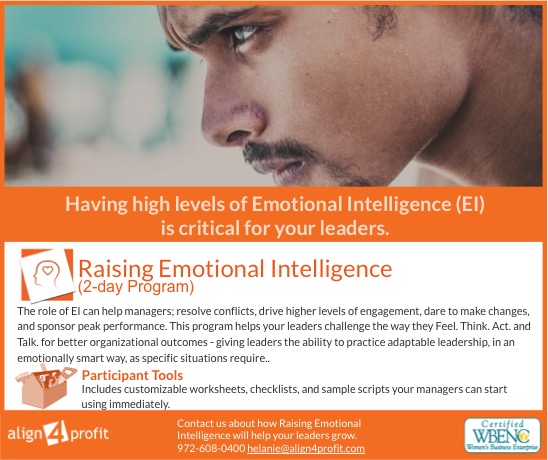Achievement Orientation Is an Emotionally Intelligent Behavior

Triggers and Adaptive Behaviors
June 25, 2018
How Can You Build Your Capacity for Empathy?
June 29, 2018In a previous blog post, Emotional Intelligence (EI) Is Not Only About Being Nice, I shared that managers with high levels of EI operate in the sweet spot.
By that I mean they Drive Accountability and they Motivate Engagement. Motivating Engagement is related to behaviors such as empathy, sociability, sensitivity, and likability. I want to home in on some of the behaviors I identify for Driving Accountability, in relationship to EI.
Leaders who excel at Driving Accountability are achievement oriented and are able to:
- Be explicit about expectations (not in a demanding way, but rather empowered)
- Provide actionable feedback (not curt, but explicit and caring)
- Set boundaries appropriately (not heavy-handed, rather inclusively crafting effective ways of working)
- Influence with an adaptive style (not pushy, but through high levels of adapting to their audience)
- Follow up appropriately (not micromanaging, rather offering support)
Checking the above list you may find that some of your leaders would score well. What about some of the other managers in your organization? Do they tend to be perhaps stronger when it comes to motivating their teams, but lack some skills in driving accountability?
Let’s dig a bit deeper into following up appropriately. Emotionally intelligent managers get things done through others while empowering them to succeed. They leave team members alone to execute while coaching effectively when needed, but they don’t want to be seen as laissez-faire or absent. Neither do they want to come across as task masters or micromanaging. Emotional intelligence is about a constant balance between these somewhat opposite approaches.
What actions can your managers take to follow-up? How can your leaders delegate tasks to employees and then trust them to make decisions for themselves? Try these 4 Emotionally Intelligent Follow-up techniques, today:
- Establish trust. Managers with high EI build trust by interacting one-on-one with their employees, learning what tasks they excel at, observing them doing their daily jobs, and providing feedback that raises psychological safety. When it is time to delegate a specific task, they are good at understanding each employee’s strengths and weaknesses and know who is ready to take on more responsibility and who needs more experience before tackling big decisions.
- Have a mindset of checking in, not checking up. The best way to establish the difference is to gain input from each employee. The difference is often in the employee’s perception. What does your team member view as a reasonable time to check back in? What is their level of competence or confidence within a specific task? How do you adjust frequency of checking in, with each employee and each task?
- Accept failure as a possibility. EI managers recognize that failure is a natural part of delegation. Failure is a normal part of learning and growing, too. Without it your team may not innovate and take risks. If you accept that failure is a possibility and know how to manage your reaction to failure, that is when effective emotional management will become visible, and you’ll have a much easier time giving up some of your micromanaging tendencies.
- Coach. Offer emotional support. A manager with high EI enables performance and does not reprimand employees. They discuss gaps between actual vs. expected performance in a calm way. They brainstorm solutions and help employees commit to implementing changes. Consider asking directly about how employees are feeling about work so that they know you care.
If you want your leaders to be skilled at driving deeper levels of accountability throughout their teams and to do so with heart, consider our Raising Emotional Intelligence Program for all levels of executives and managers. Our practical hands-on facilitation will equip your leaders with tools to implement changes immediately. High performers understand emotional intelligence and diligently work on honing their skills on-going. EI is a skill every manager needs.
Follow us on LinkedIn



